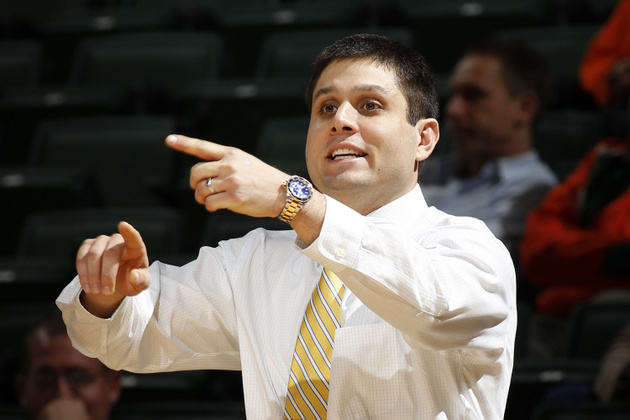
Unlike most young basketball players who grow up dreaming of playing in the NBA someday, Wes Miller always knew he wanted to coach.
Miller was so confident in his chosen career path he left James Madison in 2003 to walk-on at North Carolina mostly because he wanted to spend the next four years learning from Tar Heels coach Roy Williams.
That decision is one of the biggest reasons Miller has risen so rapidly in the coaching profession. The 29-year-old briefly became the youngest head coach in the nation last December when UNC Greensboro fired Mike Dement after a 2-8 start and named Miller as its interim replacement.
Miller, now Division I's second-youngest coach behind Wagner's Bashir Mason, earned a longterm contract this March after leading the Spartans to 11 wins in their final 16 games. He chatted with me this week about the challenges of being a young head coach, how he has leaned on Williams for advice and which former Tar Heel nemesis was his favorite player as a kid.
JE: How long have you known you wanted to get into coaching?
WM: I knew at a really young age that I wanted to coach. That's one of the main reasons I chose to go play for Coach Williams at North Carolina. I wanted to learn. I wanted to be part of that network and that family. I loved playing the games but I knew there would be a time it would end. I knew what I wanted to do for my career was to coach.
JE: Where does that passion for coaching come from? Did anyone in your family coach or teach?
WM: I don't have anyone in my family who coached or taught. I grew up in Greensboro and Charlotte, right in the middle of college basketball country. I joke all the time that North Carolina is the mecca of college basketball cities. With the history of the ACC and the ACC tournament, there's just so much energy for the college game around here. I grew up in the middle of that. I couldn't name a lot of players in the NBA, but I could tell you all the players who played for North Carolina, Duke and Wake Forest each year. I think I just had a passion for basketball at a really young age and coaching just seemed like a natural progression.
JE: So if I say the name Randolph Childress, for example, you're going to have some fond memories?
WM: You're playing with my emotions now. I wore No. 22 my whole career because Randolph Childress was my favorite player. The ultimate irony was I ended up at Carolina and Randolph was an absolute monster against Carolina as a player. I was wearing that number because I idolized him as a child. My dad went to Wake Forest, so we went to all the Wake Forest games. When Randolph was playing there, that's kind of when I started really taking my passion for the game to another level. I wore No. 22 my whole life at every level I played.
JE: Has anyone ever had a better three days than his ACC tournament in '95?
WM: I was there in Greensboro. I'll never forget it.
JE: When you were at North Carolina, did you observe Roy Williams in a different way than your teammates since you knew you wanted to go into the coaching profession?
WM: I think I always had a mentality that I wanted to learn while I was there and understand why we were doing things rather than just what we were doing. My first year there, I was a redshirt because I transferred from James Madison. I remember watching Coach Williams during timeouts and thinking to myself, 'Man, he's really, really good. I don't know if I'm cut out for this.' But I do think that redshirt year allowed me to look at it a little differently. I tried to always keep coaching in the back of my mind. Coach Williams also knew I wanted to coach and he'd occasionally say things to me along those lines to help me. Let's just say it was the right decision to go there. I pretty much steal everything I do now from what I learned.
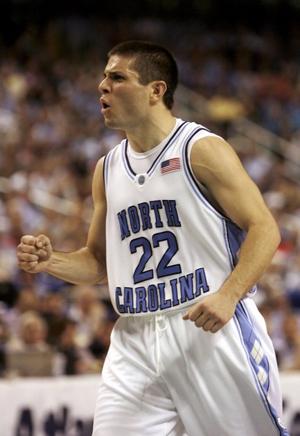 JE: So you definitely feel like you emulate Roy Williams as a coach?
JE: So you definitely feel like you emulate Roy Williams as a coach?
WM: The philosophy I have about the way we're going to play and the things we're going to do in our program, that comes from my time at Carolina and from being around Coach Williams. I have things I learned from other places and there are things I do differently, but the foundation for who I am as a coach and what I want our program to be about is really derived from the experiences I had under Coach Williams.
JE: How much have you leaned on Roy Williams for advice since you've gotten into coaching?
WM: I've always talked with Coach Williams before I made any career decisions. Getting into the business, taking different assistant coaching jobs, I've always tried to go back to Chapel Hill, watch practices and ask questions. I've sat in coaching meetings when I had time. I've really tried to take advantage of the fact that I have a resource most people just don't have. Again, I think I'm really fortunate and lucky that the person I can call for advice is arguably one of the best coaches in the history of the game.
JE: How emotional was it for you when you were named head coach last season?
WM: You've got to remember we were 2-8 and there's a ton of adversity when there's a coaching change in the middle of the year. Whether it's the players, assistant coaches or you're in my position where you're being elevated to the interim role, there's adversity. One thing we tried to preach with our players throughout the whole time was we can't control what the situation is but we can control how we deal with it. I tried to lead by example in that way. I didn't have a whole lot of time to think about what was going on, but I tried to approach every day positively and help us get better.
JE: You're only a few years older than a lot of the players you're coaching. Is that an advantage? Disadvantage? Both?
WM: I say to our guys all the time, I'm young and that means I'm not as experienced as a lot of coaches. That's probably a disadvantage. I'm sure people say that about us in recruiting all the time. But the positive is it wasn't that long ago I was in their shoes. I feel like I still have a really good feel for what they're going through. That's probably the biggest positive to being this age. I think it's probably the biggest positive to last year. During that situation, I tried to put myself in their shoes and think about what it would be like if I had to go through that.
JE: Diagramming the game-winning play to beat the Citadel in the final minutes last season, how big was that in terms of getting the team to believe in you?
WM: There were lots of moments throughout the season that helped our players gain confidence in me and ultimately helped the university and the community gain confidence in me as a coach. The Citadel game was certainly one of those moments. We drew up the simplest play on the board before that last possession. I've gotten a lot of credit for it, but it was pretty simple and elementary what we put on the board. What was amazing was that our guys were able to go out and execute it with perfect timing and precision. I think it was one of those moments where our guys maybe started to believe in me a little bit more. All that said, the reason we were successful last year was they were the kind of kids that were resilient, stuck together and fought through adversity. I think it had a lot less to do with me than who they are as people and what they were able to do in a difficult situation.
JE: Do you think the players didn't get enough credit for how they handled the midseason coaching change?
WM: I feel like our guys had so many chances to give in. They would have had so many excuses everyone would have understood, yet they never chose to take that path. That's unique in itself and really unique with the culture of college basketball today. They chose to take the harder path and fight through adversity the correct way. I think more than anything I'm fortunate to have these types of kids. It makes me look a lot better than I am.
JE: You guys had a particularly significant commitment last week. I know you can't talk about an unsigned recruit but speaking generally, how excited are you about how recruiting is going?
WM: Recruiting is obviously extremely important to any college program. I feel like I hired a staff that's charismatic, energetic and positive. I feel like I hired a staff that understands the game but also understands how to develop players on the floor and in life. I think that's a really important part of recruiting, and I hope that people and prospects out there are going to want to be part of some of the really positive things we're doing with this program.
JE: I look at your roster and I see a team that will be good next season and loaded the year after. Can you contend in the SoCon next season or are you a year away?
WM: My personality and belief is if you don't think you can contend, then why the heck are we even practicing. Our goal as a program is to contend for conference championships every year, and I don't care if we're starting five freshmen or five seniors. Next year, we have a team that I hope comes out and competes. It's not going to come easy. We have to be great defensively. We're really going to have to play better team basketball this year. But I think with Trevis Simpson, who led the league in scoring last year, and Derrell Armstrong, who was our second-leading scorer, I think we have some pieces. If we work hard and take the right steps, I think we'll be competitive in the league.
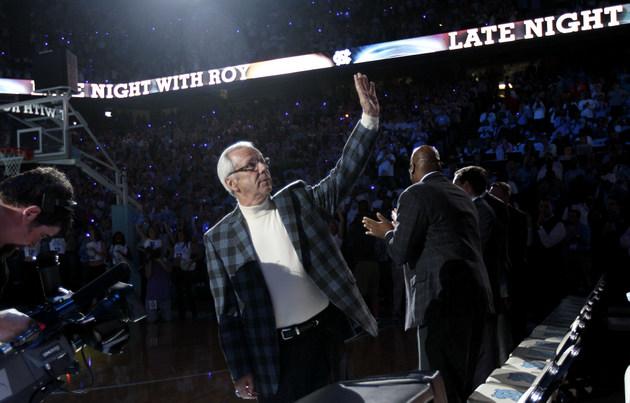

 In the wake of the surgery he underwent Sept. 19 to remove a tumor from his right kidney, North Carolina coach Roy Williams had to spend a week or two away from basketball in order to recuperate.
In the wake of the surgery he underwent Sept. 19 to remove a tumor from his right kidney, North Carolina coach Roy Williams had to spend a week or two away from basketball in order to recuperate.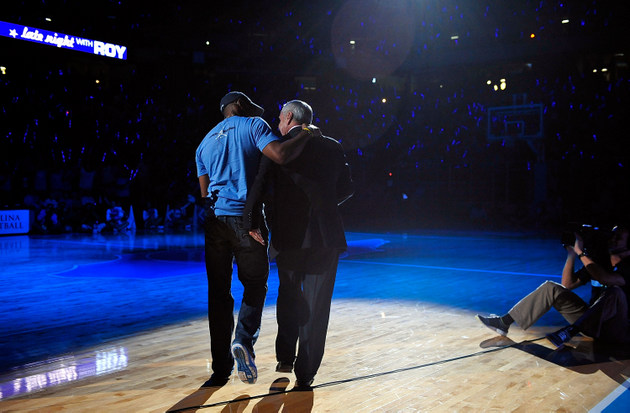
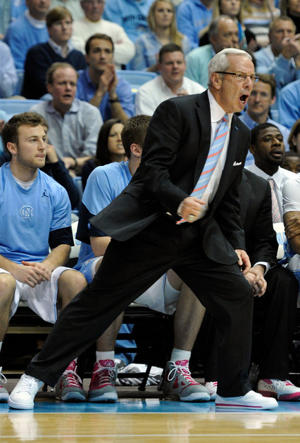 Williams' involvement with fighting cancer doesn't end with the "Fast Break Against Cancer" event. He has made several donations to UNC Lineberger and routinely visits the hospital after games to meet with cancer patients and see if he can lift their spirits.
Williams' involvement with fighting cancer doesn't end with the "Fast Break Against Cancer" event. He has made several donations to UNC Lineberger and routinely visits the hospital after games to meet with cancer patients and see if he can lift their spirits.
 JE: So you definitely feel like you emulate Roy Williams as a coach?
JE: So you definitely feel like you emulate Roy Williams as a coach?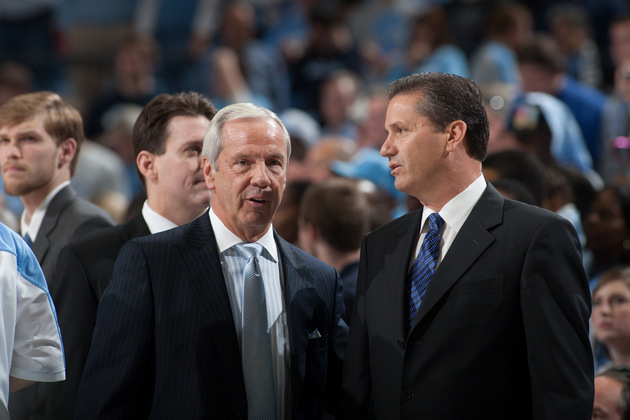
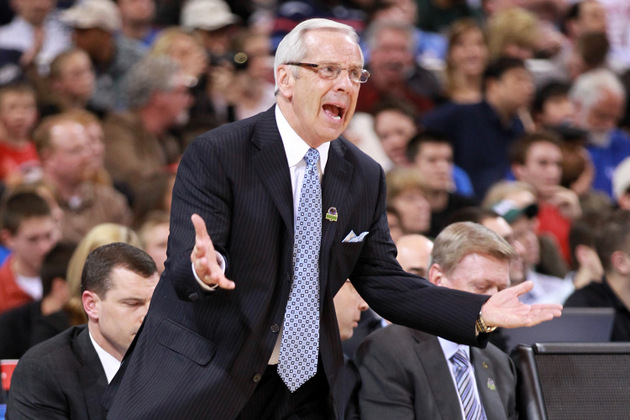
Recent Comments